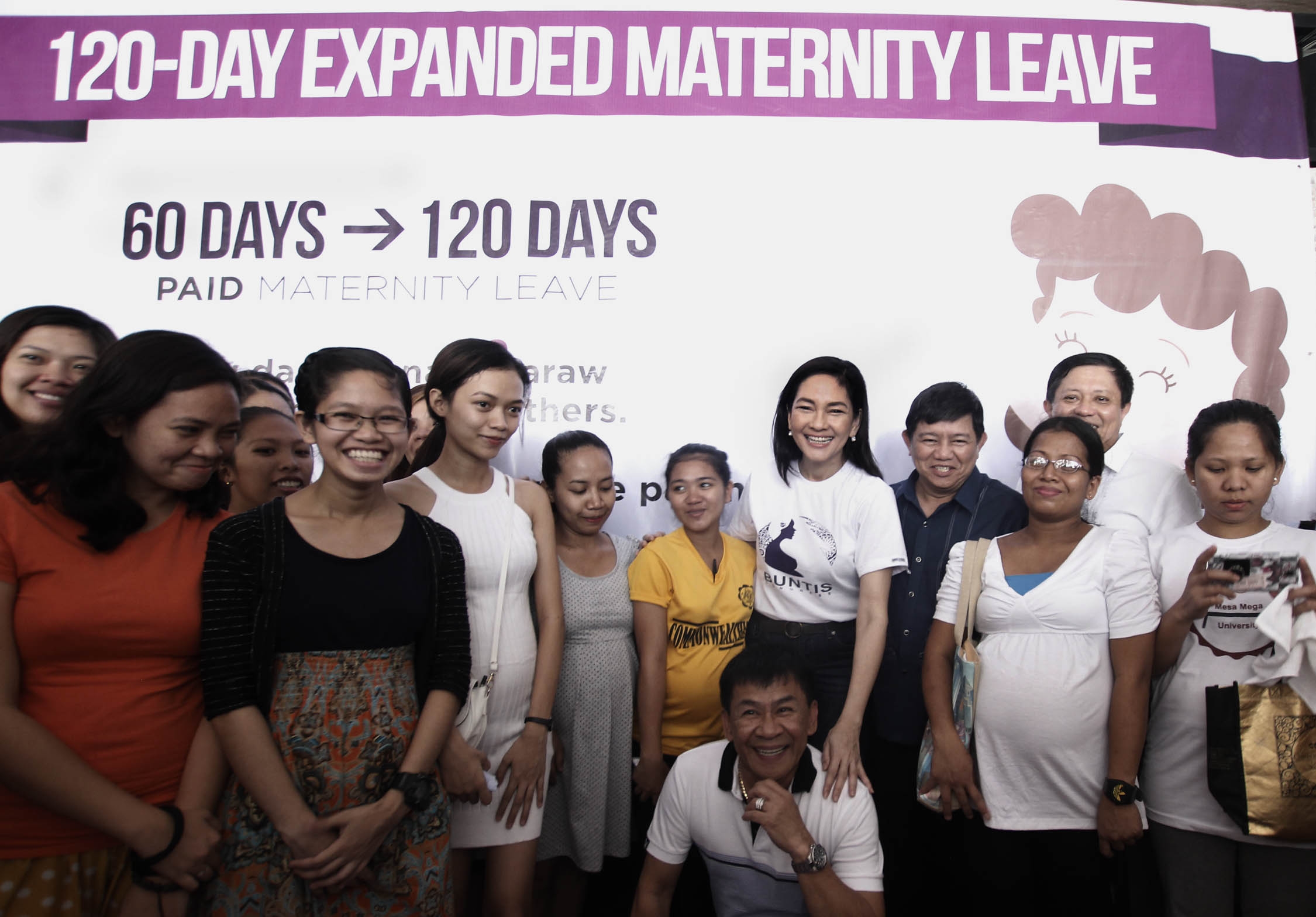
EXPECTANT The campaign for the passage of the Expanded Maternity Leave Act received a big boost through activities like the “Buntis Congress” held in Quezon City in March 2017 and attended by Sen. Risa Hontiveros (fourth from right), the measure’s main proponent in the Senate. —EARVIN PERIAS
MANILA, Philippines–Is the Expanded Maternity Leave Act good for women but bad for business?
While the law is good in concept and hailed as a victory for women, business leaders are concerned that it could close job opportunities for women, especially in small and medium enterprises (SMEs) that, unlike many multinational corporations, may find the additional cost of doing business too steep.
But among large corporations listed on the Philippine Stock Exchange, the new maternity law is not expected to gnaw on earnings.
“These [employed] women won’t get pregnant at the same time,” said Eagle Equities Inc. president Joseph Roxas.
Insignificant cost
Said Raymond Neil Franco, head of research at Abacus Securities: “The additional cost probably won’t be significant. I don’t think it will affect hiring decisions either. Large corporations are already having a hard time looking for talent, so they’ll hire anyone who is qualified regardless of gender.”
But SMEs, like the agribusiness operated by Nenita Martinez (not her real name), might rethink their hiring policies.
With the new law, Martinez said, she might have to shift her full-time employees into project-based work that are “limited” and “not regular.”
“We handle live plants and these plants need consistency [of handling],” she said.
Management Association of the Philippines president Riza Mantaring said that “many companies already have a nondiscrimination policy,” but conceded that the law raised “difficult questions.”
“At first glance, the obvious conclusion would be that it is good for employees and more costly for business. But it’s not as simple as it looks. Would it result in unconscious bias on the part of employers against hiring females? On the other hand, would the longer maternity leaves result in better retention of good employees who might otherwise resign, and better employee engagement overall? There are many issues to consider, and I suspect the impact will not be the same for all,” she said.
Most business leaders are also of two minds about the new law, with the Philippine Chamber of Commerce and Industry (PCCI) and Employers Confederation of the Philippines (Ecop) saying that it may be a burden on most business establishments in the country, as the law almost doubled what used to be only 60 days paid maternity leave for normal childbirth, and 78 days for cesarean delivery—far below the international standard of at least 98 days.
Social Security System (SSS) president Emmanuel Dooc said companies would have to pay more to SSS to enable the state fund to cover the additional P7.5 billion needed to grant the extra paid leaves.
Problem for micro firms
Coping with such increases might be a problem for micro firms that account for nearly 90 percent of the country’s businesses, according to PCCI president Alegria Limjoco.
“It could also have adverse effect on married women of reproductive age because it could push them out of competition,” added Limjoco, a mother herself.
Small companies, which, according to the Department of Trade and Industry website, comprised 89.59 percent of the country’s businesses in 2017 at 828,436, might prefer to hire men, Limjoco said.
But John Forbes, senior adviser of the American Chamber of Commerce of the Philippines, doesn’t think “the additional cost of doing business would be very high since the family size in urban areas is declining.”
European Chamber of Commerce of the Philippines president Nabil Francis described the law as “a welcome development” and a “positive move” that would have an impact on the operational costs of businesses that in turn “will affect the Philippines’ overall competitiveness.”
“On a positive note, this changes the country’s current standing as one of the Asean member states with the shortest maternity leave,” he said, adding that the group will monitor developments to arrive at an optimal solution for both employers and employees.
While it’s music to the ears among large and medium companies, 90 percent of businesses that are micro are going to find it difficult, warned Ecop president Sergio Ortiz-Luis Jr. “[It’s a] little benefit, but the whole industry suffers,” he added.
Law may be harsh
Asked if Ecop would do something about it, Ortiz-Luis said: “Anyway, it’s already the law. It may be harsh but we just have to live with it.”
In Congress, Surigao del Sur Rep. Johnny Pimentel, a father of five, is pushing for a bill that would similarly lengthen the paternity leave for new fathers from seven to 15 days.
“We have to give fathers at least half a month off work, with full pay, for them to be able to lend ample support to their wives in nursing their newborns, and to help mothers recuperate from childbirth,” Pimentel said.
“There’s no question a longer paternity leave will go a long way in improving the Filipino family’s overall work-life balance,” Pimentel said, adding that the proposed leave benefits would apply only to the man’s first four children with his lawful wife.
The bill is pending in the committees on labor and employment, and on civil service and professional regulation. —WITH A REPORT FROM DJ YAP